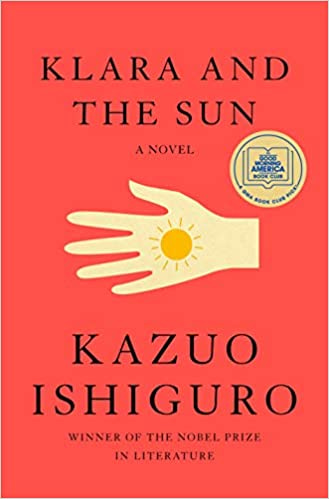
Review by J Adrian Zimmer

Review by J Adrian Zimmer
At any given time there are things we know and things we don't. Not being aware of things we don't know, we cannot think about them. For us they simply do not exist, not until someone or something makes us aware of them.
Author Kazuo Ishiguro puts us inside the mind of an artificial person named Klara in such a way that we learn what it like for her to not know things. She doesn't know the Earth is round and orbits the sun so she assumes the sun goes into the ground each night to get some rest. Over time she meets problems and observations that lead her to assign god-like qualities to the Sun. Grasping for a way to help a sick friend, Klara comes up with the idea of sacrificing to her god. These growing beliefs can be seen as an example of how ignorance and need can be the mothers of religion.
Klara was created to be an artificial friend or "AF" to some teenager. As the story begins she is more a sentient store mannequin than social being. Early on Klara's dual nature is crystal clear.
But after Klara is bought to be the friend of an ailing 14 year old girl, she expands her knowledge and we start to see her as fully human. Although she is still quite naive, she is no longer artificial. Ishiguro’s skill comes through here. He clearly wants us to see Klara as human without forgetting that she is not. One way he accomplishes that is by giving her optical illusions no human could have. Of course she accepts them as normal.
I might add that being somewhat knowledgeable about how her AI might work, I accept them as normal for her too.
Ishiguro has created a future in which parents not only buy AFs for their teenagers but they also have their children genetically modified or "lifted". When the parents talk about the differences between themselves and their children you almost have a sense that lifting has made their children more artificial.
Novels that depict alternate realities are tricky to write. Readers need to be told a lot about the imagined reality. The telling must be done in a way that makes readers think that they are present in a strange reality--not that they are getting a lecture about it. Information is therefore dribbled out. It is inevitable that readers will have questions. After a while those questions are tidied up. If an author doesn't wish to tidy a question up, the genre expects that anything that would raise the question in the first place will be avoided.
At least that's the usual paradigm for writers of science fiction and fantasy. Ishiguro however is not tidy and does not want his writing or his marketing to be stuffed into that genre. Reading this novel you will think of questions that never get answered. This unsettles some readers, especially sci fi readers. But for those who are honest with themselves, life itself is full of unanswered questions.
So this novel is both engrossing and question creating. By forcing us to stay aware that Klara is both human and inhuman Ishiguro gets us to consider what it means to be human. This is the central question of the novel. Ishiguro eventually sets subtlety aside and asks the question directly.
There's more. To the extent that we accept Klara is human, we can see how our own minds can be considered artificial. For example like Klara's mind our own do not directly see the real world. There is an intermediary. Kara's is digital, ours is biological. Each intermediary creates an image in a mind, neither brings reality to a mind. Most of the time that doesn't make a difference. When it does we may not know it.
Which brings us back to not knowing things. While inside Klara's mind we still have our own knowledge. This dual perspective lets us see how her mind pushes against the edges of its knowledge by making things up and acting on them. What she does is so natural it could be what we would do in her situation. In fact we have done similar things in our own situations. It's a form of creativity. Celebrate it. If it leads us to assert something that is stupid when seen from greater knowledge, there’s no shame in that. Shame comes later when we stick to our beliefs in the presence of contrary evidence. Ishiguro spares Klara that fate.